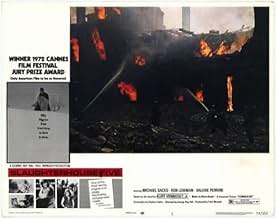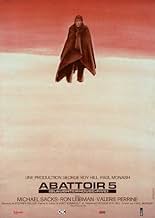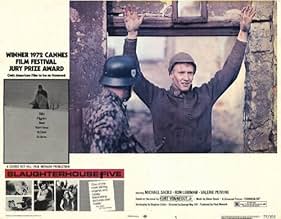IMDb-BEWERTUNG
6,8/10
14.417
IHRE BEWERTUNG
Ein Mann namens Billy Pilgrim erzählt die Geschichte, wie er in der Zeit hängen blieb und von Außerirdischen entführt wurde.Ein Mann namens Billy Pilgrim erzählt die Geschichte, wie er in der Zeit hängen blieb und von Außerirdischen entführt wurde.Ein Mann namens Billy Pilgrim erzählt die Geschichte, wie er in der Zeit hängen blieb und von Außerirdischen entführt wurde.
- Regie
- Drehbuch
- Hauptbesetzung
- Auszeichnungen
- 3 Gewinne & 4 Nominierungen insgesamt
Friedrich von Ledebur
- German Leader
- (as Friedrich Ledebur)
Ekkehardt Belle
- Young German Guard
- (as Nick Belle)
Empfohlene Bewertungen
This is a workmanlike job of filmmaking. Many of the incidents and characters of the Kurt Vonnegut novel are in the film, but the filmmakers have not come up with a way of duplicating the novel's darkly comic tone, and the climactic firebombing of Dresden, the book's reason for being, is curiously unimpressive in the film. Michael Sacks is suitably sweet and blank as Billy Pilgrim and Ron Liebman gives frightening life to the maniacal Paul Lazzaro. Not showing us the Trafalmadorians, who abduct Billy and put him on display on their planet, seems a cheat.
Kurt Vonnegut was more than worthy of the National Book Award that he received for the novel Slaughterhouse Five, but his humor and literary expertise are often lost in screenplays.
This flawed movie was a cult classic since its release because legions of Vonnegut fans were so fond of the novel that they could overlook the film's flaws. This is probably the only Vonnegut novel to make the transition to the screen as a movie that more than a handful of people are willing to watch. And they watch it again and again. I am reminded of Voltaire lovers who enjoy Leonard Bernstein's Candide. This seems to be the best of all possible Vonnegut movies.
There is a wealth of trivia associated with the cast. Michael Sacks disappeared into obscurity. Sharon Gans joined a community theater company that seemed more like a cult. Holly Near became a feminist folksinger. Valerie Perrine would later give a great performance as Honey Bruce in Bob Fosse's Lenny. Perry King and Ron Liebman became minor stars.
The story is largely allegorical. It is not science-fiction. Vonnegut is coping with the trauma of World War II, particularly the horrors he witnessed during the firebombing of Dresden. Billy Pilgrim's emotional numbness and alientation are characteristic of combat fatigue or post traumatic stress. Despite the lack of a chronological plot, Billy Pilgrim's arc is linear.
To the uninitiated, being "unstuck in time" can be confusing. It's sort of like one's first encounter with hypertext. Perhaps, that's why the movie is better on the second or third viewing. The key to enjoying Slaughterhouse Five is to focus on the best scenes and performances -- much like Billy Pilgrim's advice on living.
This flawed movie was a cult classic since its release because legions of Vonnegut fans were so fond of the novel that they could overlook the film's flaws. This is probably the only Vonnegut novel to make the transition to the screen as a movie that more than a handful of people are willing to watch. And they watch it again and again. I am reminded of Voltaire lovers who enjoy Leonard Bernstein's Candide. This seems to be the best of all possible Vonnegut movies.
There is a wealth of trivia associated with the cast. Michael Sacks disappeared into obscurity. Sharon Gans joined a community theater company that seemed more like a cult. Holly Near became a feminist folksinger. Valerie Perrine would later give a great performance as Honey Bruce in Bob Fosse's Lenny. Perry King and Ron Liebman became minor stars.
The story is largely allegorical. It is not science-fiction. Vonnegut is coping with the trauma of World War II, particularly the horrors he witnessed during the firebombing of Dresden. Billy Pilgrim's emotional numbness and alientation are characteristic of combat fatigue or post traumatic stress. Despite the lack of a chronological plot, Billy Pilgrim's arc is linear.
To the uninitiated, being "unstuck in time" can be confusing. It's sort of like one's first encounter with hypertext. Perhaps, that's why the movie is better on the second or third viewing. The key to enjoying Slaughterhouse Five is to focus on the best scenes and performances -- much like Billy Pilgrim's advice on living.
10herbqedi
The realization of this glimpse into the mind's eye of a man unstuck in time is brilliant to behold. Yes, the book is a brilliant work in its own right, and open to interpretation, as a truly complex work must be. The movie is not the book. It is Hill's interpretation of the book, and a brilliant and viable one it is.
Hill won the best Director Oscar the next year with "The Sting". He later filmed the similarly unfilmable "World According To Garp" and also did a brilliant job with it, partially by letting go of John Irving's more depressing side. Other notable credits include Butch Cassidy... and The Great Waldo Pepper.
Michael Sacks, in his first movie, and only starring role at the tender age of 24, is completely convincing and natural. He is equally effective, compelling, and believable at the six distinct stages of Pilgrim's life memorialized herein. If he weren't up to the six-in-one role, the film wouldn't work, but he is, and it does. (I wonder why he has no other major credits, and ceased acting altogether in 1984. If anyone knows, please e-mail me.)
Valerie Perrine is fine as Montana Wildhack. The other characters are all played for maximum irony and effect, and the cast delivers beautifully, without exception. Eugene Roche is the epitome of kindness as Edgar Derby, the yin, to Ron Liebman's yang, a twisted ball of anger named Paul Lazaro. John Dehner is brilliant as a war-hawk professor upset at the Vietnam protesters. His character would be as appropriate amidst today's global conflagration as it was in 1966. Lucille Benson, Kevin Conway, Sorrell Booke, Holly Near, Richard Schaal, and Perry King are the more familiar names in a uniformly excellent cast, including the German actors.
The musical score is also perfect, both in tone and substance. Vonnegut is a master of superimposing satire over irony over futility. The movie does a marvelous job of blending these contrasts and making its audience feel enriched. The music underscores all of these contrasts. The cinematography also is magnificent.
Searching desperately for something to say to show that the movie cannot be 100% perfect, the only thing I can come up with is that the pacing of the movie drags slightly when the soldiers leave the first camp for Dresdner until their new Kommandant gives his "welcoming" speech. It might have played better with about three minutes cut from that sequence. So what?
I recently saw Slaughterhouse Five for the fifth time in 27 years since I originally saw it at my college campus -- this time on DVD. I never fail to catch something new, and I never fail to enjoy it all the more.
Given how many 70's movies have failed miserably to withstand the test of time, Slaughterhouse Five is a true treat to be savored.
Hill won the best Director Oscar the next year with "The Sting". He later filmed the similarly unfilmable "World According To Garp" and also did a brilliant job with it, partially by letting go of John Irving's more depressing side. Other notable credits include Butch Cassidy... and The Great Waldo Pepper.
Michael Sacks, in his first movie, and only starring role at the tender age of 24, is completely convincing and natural. He is equally effective, compelling, and believable at the six distinct stages of Pilgrim's life memorialized herein. If he weren't up to the six-in-one role, the film wouldn't work, but he is, and it does. (I wonder why he has no other major credits, and ceased acting altogether in 1984. If anyone knows, please e-mail me.)
Valerie Perrine is fine as Montana Wildhack. The other characters are all played for maximum irony and effect, and the cast delivers beautifully, without exception. Eugene Roche is the epitome of kindness as Edgar Derby, the yin, to Ron Liebman's yang, a twisted ball of anger named Paul Lazaro. John Dehner is brilliant as a war-hawk professor upset at the Vietnam protesters. His character would be as appropriate amidst today's global conflagration as it was in 1966. Lucille Benson, Kevin Conway, Sorrell Booke, Holly Near, Richard Schaal, and Perry King are the more familiar names in a uniformly excellent cast, including the German actors.
The musical score is also perfect, both in tone and substance. Vonnegut is a master of superimposing satire over irony over futility. The movie does a marvelous job of blending these contrasts and making its audience feel enriched. The music underscores all of these contrasts. The cinematography also is magnificent.
Searching desperately for something to say to show that the movie cannot be 100% perfect, the only thing I can come up with is that the pacing of the movie drags slightly when the soldiers leave the first camp for Dresdner until their new Kommandant gives his "welcoming" speech. It might have played better with about three minutes cut from that sequence. So what?
I recently saw Slaughterhouse Five for the fifth time in 27 years since I originally saw it at my college campus -- this time on DVD. I never fail to catch something new, and I never fail to enjoy it all the more.
Given how many 70's movies have failed miserably to withstand the test of time, Slaughterhouse Five is a true treat to be savored.
The film Slaughterhouse 5 is a brilliantly portrayed interpretation of a great but typically multilinear novel by science fiction author Kurt Vonnegut. With all due respect to the literary critics, sci fi really is what Vonnegut most often wrote - whether or not it is viewed as allegory or even 'serious literature'. As such, it was not really made to convey the same messages,nor even the aesthetics of the book, but rather to convey the director's (and others on the creative team) impressions of the book.
The book is also brilliant, but none of Vonnegut's work is easily adapted to the medium of film. Not quite the task Cronenberg took on when he directed Burrough's Naked Lunch, but very similar in method.
S-5 exposes us to the life of Billy Pilgrim (Michael Sacks) and his many loves (his dog spot, his wife played by Holly Near and an actress played by Valerie Perrine), as he either blacks out and travels into the deep recesses of his memory experiencing the delusion of time travel or (as indicated by his occasional leaps forward in time), he actually has become 'unstuck in time.' Between trips back to Dresden during its WWII bombing and trips forward to the planet Tralfamador, it seems that Billy is constantly tripping. Yet he manages to build a successful and very normal American life despite his bizarre and uncontrollable time-travel habit.
The film illustrates the non-linear manner in which the book is written by skipping from time to time in a seemingly random manner, but it manages to do so without losing focus on Pilgrim, who is, in fact always living in the present regardless of what time he happens to be experiencing. Fantastic directoral method!
The film makes a lot of subtle, simple and very good points by making Billy - a quiet simple guy with an extraordinary set of circumstances in his life - a true hero simply because he is relatively nice, somewhat aloof, happy, and quite normal. Sacks' performance is spot-on.
This film is beautifully photographed, very well paced, perfectly directed and edited. The acting is all quite good, and comes from a well appointed cast mostly consisting of character actors. I was particularly impressed with Eugene Roche's excellent portrayal of Edgar Derby.
Highly recommended for the art-house crowd and friends of intelligent sci fi.
The book is also brilliant, but none of Vonnegut's work is easily adapted to the medium of film. Not quite the task Cronenberg took on when he directed Burrough's Naked Lunch, but very similar in method.
S-5 exposes us to the life of Billy Pilgrim (Michael Sacks) and his many loves (his dog spot, his wife played by Holly Near and an actress played by Valerie Perrine), as he either blacks out and travels into the deep recesses of his memory experiencing the delusion of time travel or (as indicated by his occasional leaps forward in time), he actually has become 'unstuck in time.' Between trips back to Dresden during its WWII bombing and trips forward to the planet Tralfamador, it seems that Billy is constantly tripping. Yet he manages to build a successful and very normal American life despite his bizarre and uncontrollable time-travel habit.
The film illustrates the non-linear manner in which the book is written by skipping from time to time in a seemingly random manner, but it manages to do so without losing focus on Pilgrim, who is, in fact always living in the present regardless of what time he happens to be experiencing. Fantastic directoral method!
The film makes a lot of subtle, simple and very good points by making Billy - a quiet simple guy with an extraordinary set of circumstances in his life - a true hero simply because he is relatively nice, somewhat aloof, happy, and quite normal. Sacks' performance is spot-on.
This film is beautifully photographed, very well paced, perfectly directed and edited. The acting is all quite good, and comes from a well appointed cast mostly consisting of character actors. I was particularly impressed with Eugene Roche's excellent portrayal of Edgar Derby.
Highly recommended for the art-house crowd and friends of intelligent sci fi.
"Slaughterhouse 5" is perhaps the best book-film translation I've ever seen.
Let me safely say that Kurt Vonneguts 'Slaughterhouse 5' is my favourite book ever. It is incredibly funny and moving above any book I've ever read. But it is also a very complex and philosophical story with many deeply rooted undertones. As such, I strongly urge people to READ THE BOOK before you see this movie. A great many points are left unexplained to the viewer, assuming they have read Vonneguts version. As I read it beforehand, the movie didn't insult my intelligence by putting Vonneguts ideas in plain view. Instead, it relies faithfully on the viewers interpretations, not unlike the book.
Once again, unless you have a mind open like a 7-11, READ THE BOOK. Take my advice, and be immersed in the greatest story of the 20th century.
Let me safely say that Kurt Vonneguts 'Slaughterhouse 5' is my favourite book ever. It is incredibly funny and moving above any book I've ever read. But it is also a very complex and philosophical story with many deeply rooted undertones. As such, I strongly urge people to READ THE BOOK before you see this movie. A great many points are left unexplained to the viewer, assuming they have read Vonneguts version. As I read it beforehand, the movie didn't insult my intelligence by putting Vonneguts ideas in plain view. Instead, it relies faithfully on the viewers interpretations, not unlike the book.
Once again, unless you have a mind open like a 7-11, READ THE BOOK. Take my advice, and be immersed in the greatest story of the 20th century.
Wusstest du schon
- WissenswertesAlthough Kurt Vonnegut Jr.'s renowned refrain, "And so it goes", appears over 100 times in the novel, it it is not uttered even once in this film.
- PatzerWhen Billy Pilgrim is asked by the American soldiers, "Where's your rifle?", he replies that he doesn't have one because he's a chaplain's assistant. However, in the United States Army, the primary duty of the chaplain's assistant in a combat zone is to protect the chaplain, so all chaplain's assistants must carry rifles. Because Chaplains are considered ministers in uniform they are forbidden from carrying weapons even when in combat zone.
- Zitate
Billy Pilgrim: [in his sleep] You guys go on without me. I'll be alright.
Prof. Rumfoord: All he does in his sleep is quit, surrender, and apologize. I could carve a better man out of a banana.
- VerbindungenEdited into The Clock (2010)
- SoundtracksConcerto No. 5 for Harpsichord in F minor, BWV 1056 - 2nd movement 'Largo'
Written by Johann Sebastian Bach (as J.S. Bach)
Performed by Glenn Gould, Piano
Columbia Symphony Orchestra
Vladimir Goldschmann, Conductor
Top-Auswahl
Melde dich zum Bewerten an und greife auf die Watchlist für personalisierte Empfehlungen zu.
- How long is Slaughterhouse-Five?Powered by Alexa
Details
- Erscheinungsdatum
- Herkunftsland
- Offizielle Standorte
- Sprachen
- Auch bekannt als
- Slaughterhouse-Five
- Drehorte
- Prag, Tschechische Republik(as Dresden)
- Produktionsfirma
- Weitere beteiligte Unternehmen bei IMDbPro anzeigen
Box Office
- Budget
- 3.200.000 $ (geschätzt)
- Laufzeit1 Stunde 44 Minuten
- Sound-Mix
- Seitenverhältnis
- 1.85 : 1
Zu dieser Seite beitragen
Bearbeitung vorschlagen oder fehlenden Inhalt hinzufügen





































